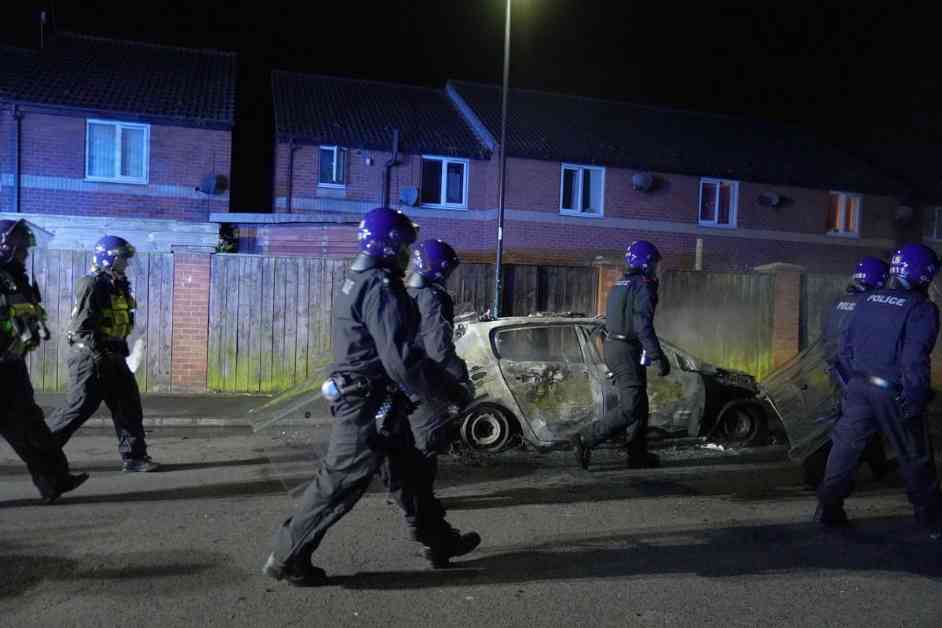Judge Urges Enhanced Charges for Key Rioters
In the aftermath of recent riots that swept through parts of the UK, a judge has made an urgent recommendation to prosecutors to consider charging offenders who played central roles in the disorder with the charge of rioting. This charge carries a maximum sentence of 10 years, compared to the maximum of five years for violent disorder.
The call for enhanced charges came from Judge John Thackray KC, the Recorder of Hull, following the sentencing of Connor Whiteley to three years in prison for his involvement in the riots in Yorkshire. Whiteley, 26, pleaded guilty to violent disorder and assaulting an emergency worker after kicking a female police officer to the ground during the unrest in the city.
Whiteley’s case highlighted the seriousness of the offenses committed during the riots, with the judge describing the violence as “racist, hate-fuelled mob violence.” He emphasized the need for prosecutors to consider the alternative charge of riot for those individuals who played prominent roles in the disturbances.
Significant Arrests Made in Connection with Nationwide Unrest
According to the National Police Chiefs’ Council, a total of 1,024 arrests have been made in connection with the recent nationwide unrest, with 372 adults and at least 65 individuals under the age of 18 facing charges. The figures reflect the widespread nature of the disorder and the significant law enforcement response to bring those responsible to justice.
Among those arrested, 69 adults have been sentenced, with the majority receiving custodial sentences. Gareth Metcalfe, 44, of Southport, received the longest sentence of those convicted of violent disorder, underscoring the severity of the offenses committed during the riots.
Examples of Sentencing for Riot Involvement
The sentencing of individuals involved in the riots has varied depending on the severity of their actions and their level of involvement. In Hull, Connor Whiteley received a three-year prison term for his role in the violent disorder that unfolded in the city. Whiteley’s actions, which included assaulting a police officer and participating in mob violence, warranted a significant sentence to reflect the gravity of his offenses.
Similarly, in Chester, a 53-year-old woman was sentenced to 15 months in prison for posting a threatening message online during the unrest. Julie Sweeney’s case highlighted the accountability individuals must take for their actions, even if they were not directly involved in the violence themselves. The judge emphasized the need for individuals to be responsible for their language, especially in the context of widespread disorder.
In Sheffield, a 60-year-old man received a sentence of two years and eight months for his involvement in attacking police officers during the riots. Glyn Guest’s actions, captured on body-worn camera footage, demonstrated the deliberate and violent nature of his behavior, leading to a significant prison term as a consequence.
Impact of Rioting on Communities
The recent riots in the UK have had a profound impact on communities across the country, with businesses, individuals, and law enforcement agencies all affected by the unrest. The targeting of specific locations, such as hotels housing asylum seekers, has raised concerns about the rise of hate-fueled violence and the need for robust legal responses to deter such behavior in the future.
The involvement of individuals from various backgrounds and ages in the riots underscores the complexity of the social issues at play. From far-right protesters to individuals with no prior criminal history, the unrest has exposed underlying tensions and grievances that must be addressed through a combination of legal measures and community engagement.
The sentencing of individuals like Connor Whiteley, Julie Sweeney, and Glyn Guest sends a clear message that the justice system will not tolerate acts of violence and intimidation. By holding individuals accountable for their actions, the courts are seeking to deter future incidents of rioting and protect the safety and security of all members of society.
In conclusion, the recent riots in the UK have highlighted the need for enhanced charges and sentencing guidelines to address the serious nature of the offenses committed during the unrest. Judges like John Thackray KC have emphasized the importance of considering riot charges for those individuals who played central roles in the disorder, signaling a tougher stance on rioting and violent behavior. As law enforcement agencies continue to investigate and prosecute those responsible for the riots, the justice system is sending a clear message that such actions will not be tolerated and will be met with severe consequences.












